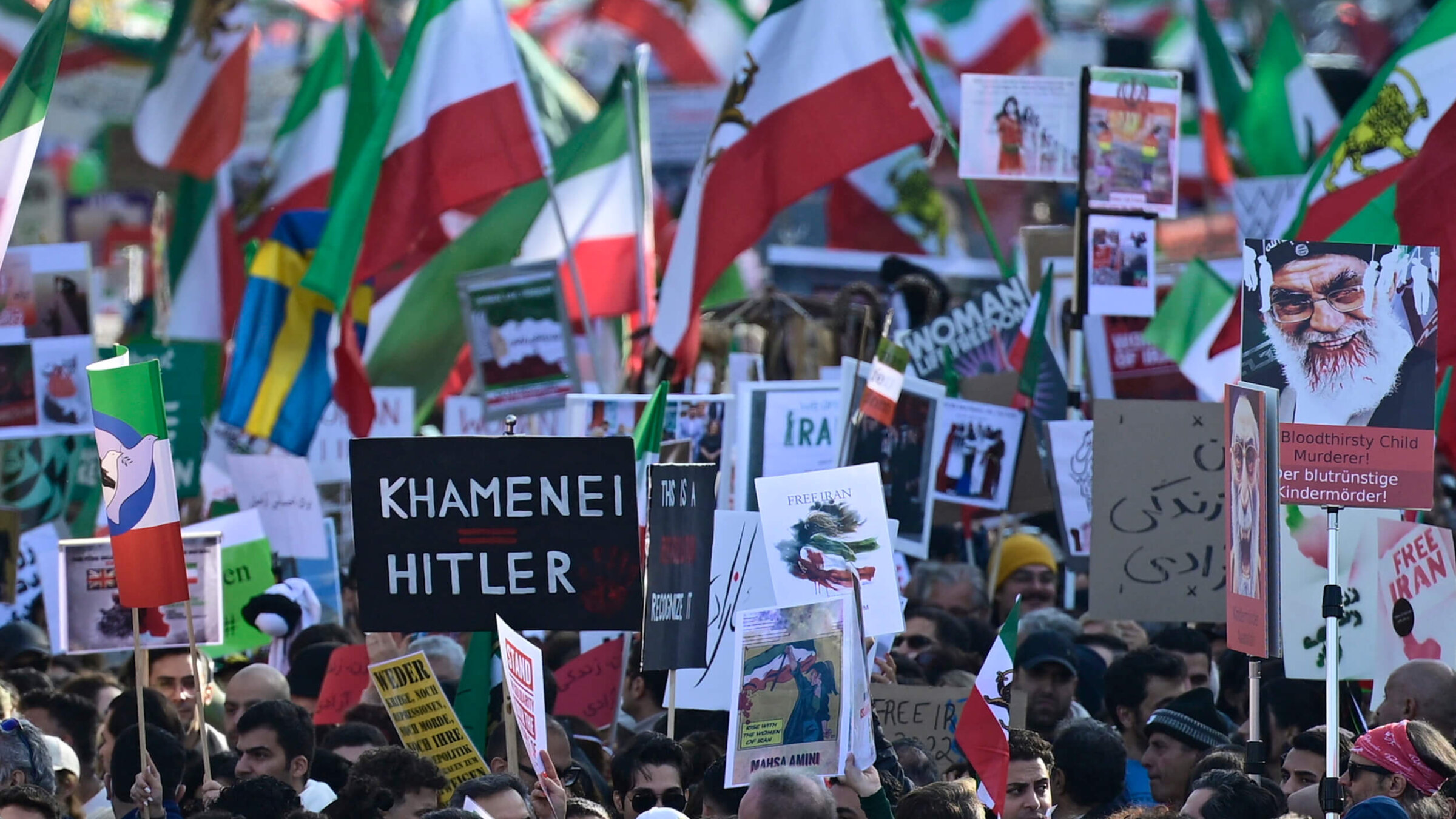Israeli leaders are using Holocaust comparisons to justify attacks on Iran. Is that kosher?
Many of the same voices who have decried invocations of the Holocaust in unrelated conflicts are suddenly going silent

Protesters hold up a placard reading “Khamenei is Hitler” in a rally in Berlin, Germany on Oct. 22, 2022. Photo by John MacDougall/AFP via Getty Images
We are not supposed to make comparisons to the Holocaust.
A guide from the Anti-Defamation League tells us that “they are often used to further a political agenda. Such references are outrageous and may be profoundly hurtful to Jews.” The United States Holocaust Memorial Museum warned in 2018 that “This oversimplified approach to complex history is dangerous.”
When, in 2022, Ukrainian President Volodymyr Zelenskyy, who is Jewish, compared Russia’s invasion of Ukraine to the Holocaust, he was criticized by several Israeli lawmakers. “War is always a terrible thing,” Yuval Steinitz of the Likud party said, “but every comparison between a regular war, as difficult as it is, and the extermination of millions of Jews in gas chambers in the framework of the Final Solution is a complete distortion of history.”
I thought of Steinitz’s outrage when, earlier this week, Israeli Prime Minister Benjamin Netanyahu said that Iran’s supreme leader, Ayatollah Ali Khamenei, was a “modern Hitler.” Israeli Defense Minister Israel Katz doubled down on the comparison, saying that, had Israel existed during the Holocaust, “We would have sent the IDF” to eliminate Hitler. “And just like that, correspondingly, I see the current situation — Khamenei is the modern Hitler.”
There was, as far as I have seen, no great public outcry or concern about these officials’ use of the example of the Holocaust. The crux of the issue therefore appears to be not that a Holocaust comparison was made, but rather what the comparison exists to achieve.
In finding some Holocaust comparisons offensive and others acceptable, Israeli officials are not alone. For example, the ADL and its leader, Jonathan Greenblatt, have repeatedly pushed back on Holocaust comparisons. However, in his remarks at the “Never Is Now” conference earlier this year, Greenblatt said, “A distinguished historian noted that for the first time since 1948, Jewish Americans are now feeling something our ancestors in Poland, Germany, Tunisia, Iraq, or wherever they lived knew far too well: fear.”
Greenblatt has also repeatedly invoked the Holocaust in relation to the Hamas attack of Oct. 7, 2023, describing it as “the worst massacre of Jews since the Holocaust” and as “the worst antisemitic massacre since the Holocaust.” The American Jewish Committee published one article early this year arguing that comparing Gaza to Auschwitz is a “moral failure” and another last spring asserting that it is Hamas, not Israel, that is genocidal.
I don’t mean to imply that these groups or individuals are hypocritical, but it seems that their issue is not Holocaust comparisons or invocations per se. They’re not saying “how could you compare anything to the Holocaust (or Hitler, or the Nazis),” but instead “how could you compare this to the Holocaust? How could you use the Holocaust to make that point?”
I am not immune to the temptation to reject Holocaust comparisons outright. I remember finding it hideously offensive when, at the height of the COVID-19 pandemic, Rep. Marjorie Taylor Greene compared letting grocery store employees who were vaccinated go maskless, provided they wore vaccination logos on their name badges, to forcing Jews to wear yellow Stars of David during the Holocaust.
The Holocaust was not, I thought, an appropriate comparison for this element of American civic life. One was a public health measure; the other was marking people for persecution, discrimination and death.
But the truth is that I was bothered by the specific comparison and its obvious aims — delegitimizing sensible measures to combat a devastating pandemic, in a salacious way, for political ends — and not by the invocation of the Holocaust to describe something happening in the United States.
Recently, I was speaking to an older Jewish man about raids by masked ICE agents rounding up workers, splitting up families and allegedly snatching nannies from public parks. “How,” I asked, “did these ICE agents go home at the end of the day and kiss their children and tell themselves that they’d done a good day’s work?”
He shrugged. “How did the people who worked at the camps?”
His comparison is not a one-to-one example. But I was not offended by it, because I understood and agreed with the point he was making: Individuals are capable of committing violence against whole populations of people on behalf of state power, and telling themselves they’re doing the right thing.
It would be more honest and productive if those interested in Holocaust memory and consciousness admitted that, more often than not, they’re upset not that a comparison is being made at all, but rather by the specific comparison that is being made. I don’t think Katz and Netanyahu are wrong to make any comparisons to Hitler or the Holocaust, ever, but I take issue with these recent instances. I think they are making these comparisons to cast their opponent as the ultimate evil, in order to justify anything and everything they might wish to do in the present conflict.
Instead of automatically gasping in shock when people, and notably politicians, make Holocaust comparisons, we should ask ourselves why they are making those comparisons. What is the point? Who does it serve? Or, to put it another way: When speaking of the Holocaust, we often say “never again.” Never again will we — what, exactly?
I am not saying that all Holocaust comparisons are created equal, or that accepting them as a feature of political life will suddenly concretize what the defining lessons of the Holocaust ought to be. Some believe, like Israeli Strategic Affairs Minister Ron Dermer, that the lesson of the Shoah is that Jews should have power; others, like scholar Omer Bartov, would argue that using the memory of the Holocaust to justify Israel’s war in Gaza is a perversion of its lessons.
I do think, though, that interrogating which comparisons we, individually and collectively, find offensive, and why, can ultimately shed light on what exactly it is that we’re claiming to try to prevent.

















